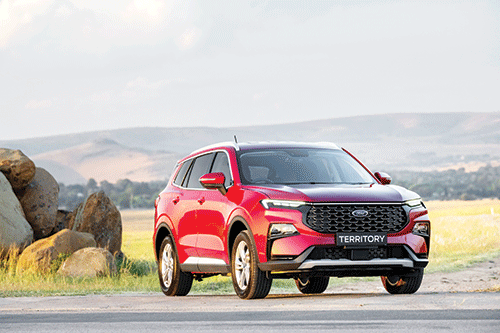Ford plans to scale up production to more than two million electric vehicles per year by 2026 and to make half of its annual sales volume electric by the end of the decade. This is according to the motoring company’s 2022 Integrated Sustainability and Financial Report which is focused on the company’s transition to lead the electric revolution.
Ford has committed to achieve carbon neutrality no later than 2050, backed by science-based interim targets it will meet by 2035. The new report features voluntary disclosures on climate-related information and details Ford’s progress to reduce emissions per vehicle by 50% from a 2019 base year and emissions from its operations by 76% from a 2017 base. Last year, the company achieved a 35% reduction in its absolute manufacturing greenhouse gas footprint from 2017 levels.
The shift to electric vehicles is critical to Ford achieving its sustainability goals, but such a transition comes with challenges – including raw materials sourcing, end-of-life battery recycling and human rights issues. To provide more information on these topics, Ford is also releasing a human rights report, a first for Ford and the US auto industry, and a combined task force on climate-related financial disclosures and climate risk scenario report.
“The truest mark of success is whether we leave the world a better place for the next generation. Each year, our integrated report reminds me of our commitment to our values, and our drive to move the needle on the issues that matter. This has been true since we launched the report 23 years ago, a first for the industry. And it could not be truer today,” said Ford Executive Chair Bill Ford.
“I am also pleased to say that this year, Ford will publish a human rights report, another first for the US auto industry. It will examine how our materials are sourced, where our products are manufactured and how our labor standards measure up. I am proud of the progress we have made over the last two decades and look forward to our continued accomplishments,” he added.
To compete and win in a new era of electric and connected vehicles, Ford plans to invest more than US$50 billion globally from 2022 through 2026 to develop electric vehicles and the batteries that power them. The company will do so from some of the most advanced and efficient auto factories in the world, creating thousands of new jobs and building a sustainable and ethical supply chain.
“This year’s report is significant because it demonstrates Ford’s longstanding commitment to transparency and holding ourselves accountable,” said Cynthia Williams, global director of sustainability, homologation and compliance at Ford. “It gives our stakeholders a clear picture of how we are going to put people first and respect human rights as we transition to electric vehicles, building on our legacy of climate action and environmental protection. Our company strategy and sustainability goals are indelibly linked – what’s good for the planet is good for our customers and our business.”
The 2022 Integrated Sustainability and Financial Report outlines how the Ford+ plan for growth and value creation builds on the company’s significant foundational strengths to scale electric vehicle production and harness connectivity and disruptive technology to make its products more accessible, more inclusive and safer to drive than ever before. Ford was one of the first US automakers to align with the international community to limit global warming as part of the Paris Agreement, and the company’s goal is to build a business model that goes beyond net-zero and becomes a net-positive for both the environment and society.
Ford’s revenue, net income and adjusted earnings before interest and taxes all improved year over year, despite industrywide semiconductor shortages, other supply chain disruptions and the ongoing effects of the Covid-19 pandemic.



